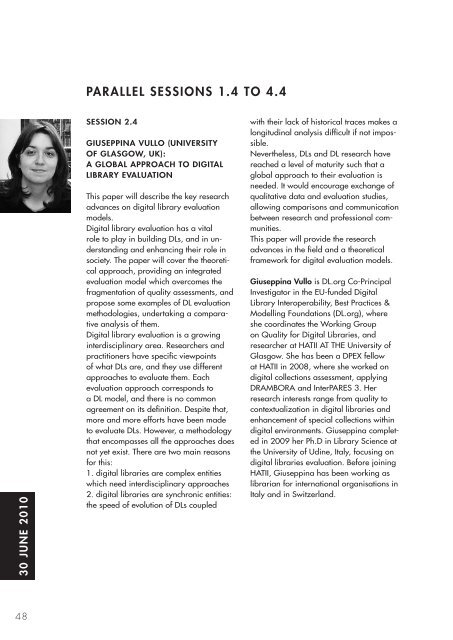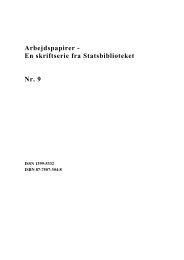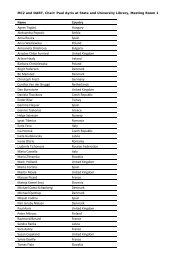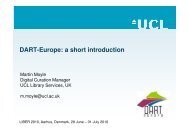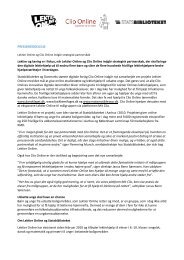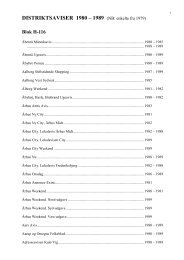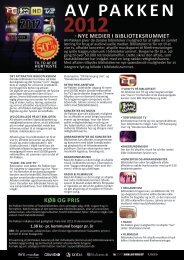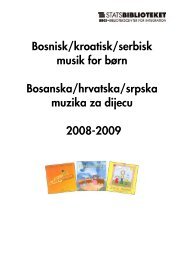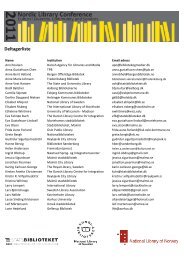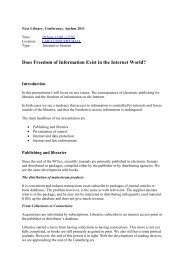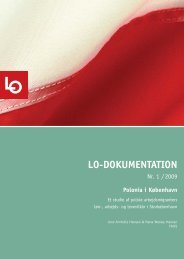LIBER 39TH ANNUAL CONFERENCE - Statsbiblioteket
LIBER 39TH ANNUAL CONFERENCE - Statsbiblioteket
LIBER 39TH ANNUAL CONFERENCE - Statsbiblioteket
Create successful ePaper yourself
Turn your PDF publications into a flip-book with our unique Google optimized e-Paper software.
PaRaLLEL sEssIons 1.4 to 4.4<br />
30 JunE 2010<br />
sEssIon 2.4<br />
gIusEPPIna vuLLo (unIvERsIty<br />
of gLasgoW, uk):<br />
a gLoBaL aPPRoach to dIgItaL<br />
LIBRaRy EvaLuatIon<br />
This paper will describe the key research<br />
advances on digital library evaluation<br />
models.<br />
Digital library evaluation has a vital<br />
role to play in building DLs, and in understanding<br />
and enhancing their role in<br />
society. The paper will cover the theoretical<br />
approach, providing an integrated<br />
evaluation model which overcomes the<br />
fragmentation of quality assessments, and<br />
propose some examples of DL evaluation<br />
methodologies, undertaking a comparative<br />
analysis of them.<br />
Digital library evaluation is a growing<br />
interdisciplinary area. Researchers and<br />
practitioners have specific viewpoints<br />
of what DLs are, and they use different<br />
approaches to evaluate them. Each<br />
evaluation approach corresponds to<br />
a DL model, and there is no common<br />
agreement on its definition. Despite that,<br />
more and more efforts have been made<br />
to evaluate DLs. However, a methodology<br />
that encompasses all the approaches does<br />
not yet exist. There are two main reasons<br />
for this:<br />
1. digital libraries are complex entities<br />
which need interdisciplinary approaches<br />
2. digital libraries are synchronic entities:<br />
the speed of evolution of DLs coupled<br />
with their lack of historical traces makes a<br />
longitudinal analysis difficult if not impossible.<br />
Nevertheless, DLs and DL research have<br />
reached a level of maturity such that a<br />
global approach to their evaluation is<br />
needed. It would encourage exchange of<br />
qualitative data and evaluation studies,<br />
allowing comparisons and communication<br />
between research and professional communities.<br />
This paper will provide the research<br />
advances in the field and a theoretical<br />
framework for digital evaluation models.<br />
giuseppina vullo is DL.org Co-Principal<br />
Investigator in the EU-funded Digital<br />
Library Interoperability, Best Practices &<br />
Modelling Foundations (DL.org), where<br />
she coordinates the Working Group<br />
on Quality for Digital Libraries, and<br />
researcher at HATII AT THE University of<br />
Glasgow. She has been a DPEX fellow<br />
at HATII in 2008, where she worked on<br />
digital collections assessment, applying<br />
DRAMBORA and InterPARES 3. Her<br />
research interests range from quality to<br />
contextualization in digital libraries and<br />
enhancement of special collections within<br />
digital environments. Giuseppina completed<br />
in 2009 her Ph.D in Library Science at<br />
the University of Udine, Italy, focusing on<br />
digital libraries evaluation. Before joining<br />
HATII, Giuseppina has been working as<br />
librarian for international organisations in<br />
Italy and in Switzerland.<br />
48


